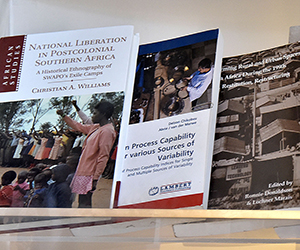
The UFS is proud of the variety of books and
scholarly articles published by scholars
in various fields.
Photo: Charl Devenish
The UFS has shown steady growth in its output of scholarly articles. Dr Glen Taylor, Senior Director of Research Development, says “the UFS has shown remarkable growth in the output of scholarly book publications over the recent years." The 13,83 subsidy units from scholarly books in 2010 has grown to 98,52 in 2014, elevating the university to fourth position nationwide.
“It is encouraging for the research office to see that the number of books has increased over the years, together with the units we receive for subsidy, but also the steady increase in the quality of our scholarly books in general,” he said.
Contributors to the growth in scholarly publications include Dr Christian Williams of the Department of Anthropology, celebrated journalist Zubeida Jaffer, as well as JC van der Merwe, the Deputy Director of the Institute for Reconciliation and Social Justice (IRSJ), and Dionne van Reenen, researcher and PhD candidate at the IRSJ. Dr Williams received the 2016 Distinguished Scholar Book Prize at the official opening of the UFS earlier this year. The book, National Liberation in Postcolonial Southern Africa: A Historical Ethnography of SWAPO’s exile camps, is the first full-length scholarly monograph on SWAPO and Namibians in exile.
The 13,83 subsidy units from scholarly books in 2010 was approximately a 10% increase in outputs from 2005 to 2010. In 2010, the higher education institution sector as a whole produced 401,68 units from scholarly books. The UFS contribution of approximately 3,44% put the university in tenth position.
“The increase in subsidy for scholarly books should stimulate the sector further, and an increase in scholarly books is expected, which complements the university research output strategy to become a leading research-intensive institution,” Dr Taylor said.